*/
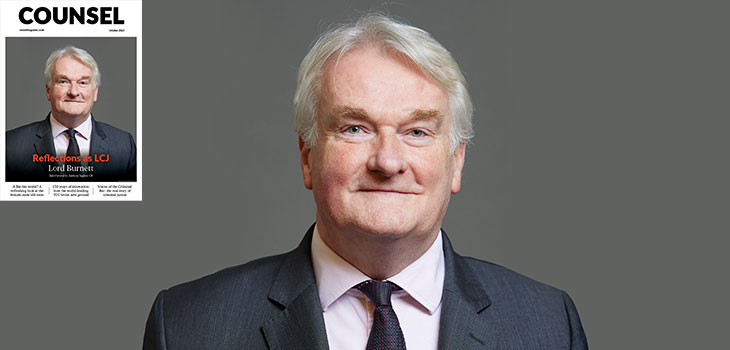
The Lord Chief Justice 2017-23 reflects on the defining decisions of his six reforming years with six Lord Chancellors. Interview by Anthony Inglese
‘Music is central to my existence. I sang seriously at my Portsmouth school and later became head chorister at Portsmouth Cathedral. Not a day goes by when I don’t listen to music. I walk to the RCJ and back plugged into music.’ Lord Burnett of Maldon is speaking with me on the day in June when his successor as Lord Chief Justice of England and Wales, Dame Sue Carr, is announced. Once he has retired there will be time for even more music in his life – he looks forward to ‘wall-to-wall Beethoven, lifting the spirits!’ in 2027 marking the 200th anniversary of Beethoven’s death.
He has recently returned from giving a guest lecture to the Judiciary in Malawi. ‘This was one of three African countries I had lived in when a boy. In 2020 Malawi’s Supreme Court had struck down the result of the so-called “Tipp-Ex” election. I wanted to offer them my visible support. It’s important for the Judiciaries of different countries to stand together, especially in the Commonwealth with our shared heritage and traditions. The Malawi government and people respected the court’s judgment. “Loser’s consent” is an often overlooked aspect of the Rule of Law.’
How did he get into law? ‘I was sporty at school – tennis, squash, badminton, sailing. They let me choose an odd combination of A levels – history, Spanish and maths. I regret now not having done some science. They then encouraged me to apply to Oxbridge. But to do what? The only connection with the law in my family was a grandfather who had been called to the Bar but was an academic. I was reasonably good at debating and public speaking. Everybody was telling me I might be a decent lawyer. I like giving things a go. I read law at Pembroke College, Oxford and I was fascinated by jurisprudence and constitutional theory; admin law too, the common law topics and EU law. Looking back, I now wish I had done history and converted to law later. But I was a young man in a hurry.’
Why the Bar? ‘It was the Bar from the moment I decided on law. I wanted to be on my feet in court, not working in an office and doing things on paper.’ He was called in 1980 and got pupillage in Temple Gardens, a classic common law chambers, where he later became head. ‘I did a bit of everything early on, much of it insurance-related. Motoring in the Magistrates’ Court, small claims in the county court, family, landlord and tenant, contract, everything. The advocacy experience was phenomenal. It’s a huge advantage to have a broad range of experience in your early years. A problem now is that people specialise too soon and so are less able to see how it all fits together.’
His involvement in government work ‘happened by accident. I was invited to be a junior counsel in the King’s Cross fire inquiry. When this went well I ended up on the main government panel in 1992. By the time I took silk in 1998 and had to leave the panel half of my practice was in public law, the remainder being in common law.’
Time pressures mean that we skip over some important years – practice as silk including work on well-documented public inquiries and on the inquests into the deaths of Diana, Princess of Wales and Dodi Fayed, appointment to the High Court in 2008 and promotion to the Court of Appeal in 2014 – to arrive at 2017, when he became LCJ.
‘I received strong encouragement from others to apply for the job. I reflected long and hard. I was comparatively young, an outside-field candidate because I didn’t hold a leadership role in the senior Judiciary. I received strong support from my fellow judges in post. I took time to think and consult about what needed to be done. The Judiciary now, post the 2005 Constitutional Reform Act, has been on a remarkable journey. We have been building a completely new structure for our unified organisation.’
His proudest achievements as LCJ? ‘Don’t say “proudest”. Better to call them “defining decisions”. My first challenge was what to do about judicial pensions. The scheme we had at that time was a disaster for recruitment. I decided I had to press government hard for a return to a special scheme for judges. Some people thought I shouldn’t, as if it didn’t work it would do me personal damage. But I knew that if I didn’t try I couldn’t look fellow judges in the face. I discussed it with Lord Chancellors and the PM of the day and it was eventually done.
‘When COVID struck in 2020 I was absolutely determined to keep all courts open. Robert Buckland [then Lord Chancellor] supported me. Across the world legal system after legal system was shutting its doors. I believed it was one thing to wind down, because we could wind back up again later when possible, but if we stopped it would have been very difficult to restart. Some members of the legal profession were doubtful, but the senior judiciary met daily to monitor developments and always followed the public health advice. Most days I talked to Robert Buckland and the head of the Courts and Tribunals Service. We kept the system going. It required extreme efforts and was exhausting for everybody. I never claim to have achieved anything alone. The way everyone responded – the Judiciary at every level, our staff, officials in the Ministry of Justice – was remarkable. The spirit of respect and close working has endured.
‘Judges at every level have worked hard on our modernisation programme. Our efforts on diversity and inclusion will have a lasting impact. We try regularly to visit schools, ones where the youngsters don’t have professional parents. The most scary thing I have to do is talk to large groups of 17-year-olds. We have improved our welfare, training and education offerings to judges. It’s been a journey. We are still on it.
‘Early on I was asked publicly would it be a good idea to broadcast the sentencing remarks of judges. I had been trained never to answer questions with a yes or no. I said yes! Eventually we got the law changed. It’s now a regular feature. It’s had an impact which I had not properly foreseen. I wanted greater public understanding of sentencing. We got that. But it’s also helped to change the public’s view of the Judiciary. Most people had probably thought the Judiciary was made up of elderly white men in long wigs. But High Court judges are a much more diverse group than that in terms of age and gender and [also gradually increasing in] ethnicity; I think the public has been pleased to see it.
‘An important part of the job has been to engage the public and explain what is going on in the judicial system. I have tried to do a lot of that. But I don’t talk about cases or about government policy. Individual judges shouldn’t opine on any of these matters. We have to be allergic to politics and the judge should never become the story. Engaging with government and Parliament is one of the most stimulating parts of my role, even though at times it’s not altogether easy.’
All that said, ‘the most important thing for the LCJ is to be respected and recognised as a good judge. I try to sit frequently in high profile cases. I never have the luxury of time for reading into cases and writing judgments as the others enjoy.’
Has he enjoyed the job? ‘I can’t imagine doing a job that wasn’t fun. I’d say 90% of the job has been enjoyable. The other 10% less so, as it involves participating in the making of senior appointments, including to the Supreme Court and the Court of Appeal, and having inevitably to disappoint people with whom I have worked for years, some of whom may be longstanding personal friends. In that respect the role is quite lonely.’
What makes good advocacy? ‘I spent six weeks as a judge’s marshal before pupillage. Cases involved murder, rape, personal injury, defective drains. I learned more than I had ever done about having to be a decent advocate from watching and talking with the judge. Later it was a real eye-opener when I became a Recorder. So: think carefully about what you are going to say, especially its structure; think about how you are going to get your points over; what are your goals, whether in argument or cross examination; identify for the court at the outset what your points are going to be; be crisp and brief, not waffly. Don’t labour every point just to avoid criticism from your client: you are trying to persuade the court, not your client. Don’t overlook the power of written advocacy: it’s your chance to plant your main points in the mind of the judge and get your case well off the ground.’
Advice to those starting out? ‘Focus on an area you think you are going to enjoy rather than one that is perceived to be well-remunerated. If you get both, you are in luck! Whatever you are doing, try to have a mixed practice at least to begin with. You are on your own. This means that quite often you have to buckle down to the work to the exclusion of everything else. The clients absolutely rely on you, whatever the case. For some it will be the biggest thing in their lives.’
Is he conscious of the history of an office which goes back to at least the 13th century? ‘The office is a constant. It matters. I am the 97th Lord Chief Justice. There will be many ahead of me into the future. An independent Judiciary is central to a nation’s wellbeing and stability. It’s also crucial to economic prosperity. A few of my predecessors have been absolute horrors. But I prefer to think of the many who have made outstanding contributions to integrity and the law.’
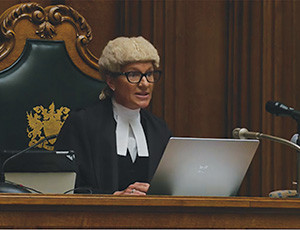
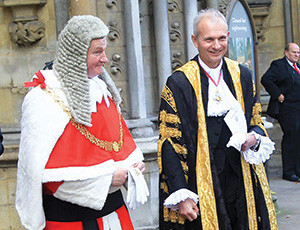
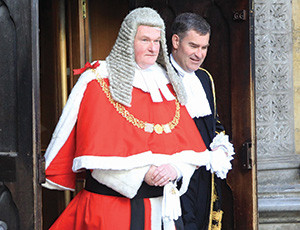
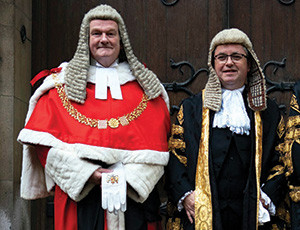
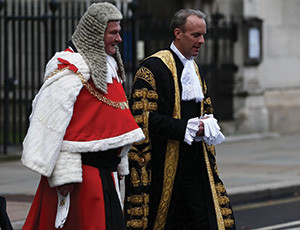
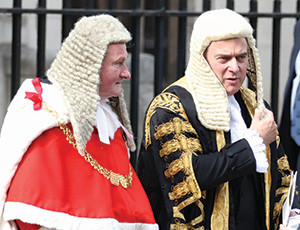
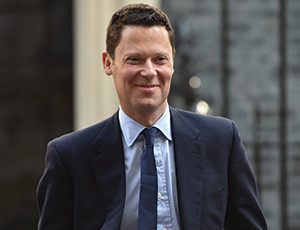
Lord Burnett worked with six different Lord Chancellors during his six-year term in office – pictured above, with David Lidington (2017-18), David Gauke (2018-19), Robert Buckland (2019-21), Dominic Raab (2021-22; 2022-23), Brandon Lewis (2022) and Alex Chalk (2023-).

‘Music is central to my existence. I sang seriously at my Portsmouth school and later became head chorister at Portsmouth Cathedral. Not a day goes by when I don’t listen to music. I walk to the RCJ and back plugged into music.’ Lord Burnett of Maldon is speaking with me on the day in June when his successor as Lord Chief Justice of England and Wales, Dame Sue Carr, is announced. Once he has retired there will be time for even more music in his life – he looks forward to ‘wall-to-wall Beethoven, lifting the spirits!’ in 2027 marking the 200th anniversary of Beethoven’s death.
He has recently returned from giving a guest lecture to the Judiciary in Malawi. ‘This was one of three African countries I had lived in when a boy. In 2020 Malawi’s Supreme Court had struck down the result of the so-called “Tipp-Ex” election. I wanted to offer them my visible support. It’s important for the Judiciaries of different countries to stand together, especially in the Commonwealth with our shared heritage and traditions. The Malawi government and people respected the court’s judgment. “Loser’s consent” is an often overlooked aspect of the Rule of Law.’
How did he get into law? ‘I was sporty at school – tennis, squash, badminton, sailing. They let me choose an odd combination of A levels – history, Spanish and maths. I regret now not having done some science. They then encouraged me to apply to Oxbridge. But to do what? The only connection with the law in my family was a grandfather who had been called to the Bar but was an academic. I was reasonably good at debating and public speaking. Everybody was telling me I might be a decent lawyer. I like giving things a go. I read law at Pembroke College, Oxford and I was fascinated by jurisprudence and constitutional theory; admin law too, the common law topics and EU law. Looking back, I now wish I had done history and converted to law later. But I was a young man in a hurry.’
Why the Bar? ‘It was the Bar from the moment I decided on law. I wanted to be on my feet in court, not working in an office and doing things on paper.’ He was called in 1980 and got pupillage in Temple Gardens, a classic common law chambers, where he later became head. ‘I did a bit of everything early on, much of it insurance-related. Motoring in the Magistrates’ Court, small claims in the county court, family, landlord and tenant, contract, everything. The advocacy experience was phenomenal. It’s a huge advantage to have a broad range of experience in your early years. A problem now is that people specialise too soon and so are less able to see how it all fits together.’
His involvement in government work ‘happened by accident. I was invited to be a junior counsel in the King’s Cross fire inquiry. When this went well I ended up on the main government panel in 1992. By the time I took silk in 1998 and had to leave the panel half of my practice was in public law, the remainder being in common law.’
Time pressures mean that we skip over some important years – practice as silk including work on well-documented public inquiries and on the inquests into the deaths of Diana, Princess of Wales and Dodi Fayed, appointment to the High Court in 2008 and promotion to the Court of Appeal in 2014 – to arrive at 2017, when he became LCJ.
‘I received strong encouragement from others to apply for the job. I reflected long and hard. I was comparatively young, an outside-field candidate because I didn’t hold a leadership role in the senior Judiciary. I received strong support from my fellow judges in post. I took time to think and consult about what needed to be done. The Judiciary now, post the 2005 Constitutional Reform Act, has been on a remarkable journey. We have been building a completely new structure for our unified organisation.’
His proudest achievements as LCJ? ‘Don’t say “proudest”. Better to call them “defining decisions”. My first challenge was what to do about judicial pensions. The scheme we had at that time was a disaster for recruitment. I decided I had to press government hard for a return to a special scheme for judges. Some people thought I shouldn’t, as if it didn’t work it would do me personal damage. But I knew that if I didn’t try I couldn’t look fellow judges in the face. I discussed it with Lord Chancellors and the PM of the day and it was eventually done.
‘When COVID struck in 2020 I was absolutely determined to keep all courts open. Robert Buckland [then Lord Chancellor] supported me. Across the world legal system after legal system was shutting its doors. I believed it was one thing to wind down, because we could wind back up again later when possible, but if we stopped it would have been very difficult to restart. Some members of the legal profession were doubtful, but the senior judiciary met daily to monitor developments and always followed the public health advice. Most days I talked to Robert Buckland and the head of the Courts and Tribunals Service. We kept the system going. It required extreme efforts and was exhausting for everybody. I never claim to have achieved anything alone. The way everyone responded – the Judiciary at every level, our staff, officials in the Ministry of Justice – was remarkable. The spirit of respect and close working has endured.
‘Judges at every level have worked hard on our modernisation programme. Our efforts on diversity and inclusion will have a lasting impact. We try regularly to visit schools, ones where the youngsters don’t have professional parents. The most scary thing I have to do is talk to large groups of 17-year-olds. We have improved our welfare, training and education offerings to judges. It’s been a journey. We are still on it.
‘Early on I was asked publicly would it be a good idea to broadcast the sentencing remarks of judges. I had been trained never to answer questions with a yes or no. I said yes! Eventually we got the law changed. It’s now a regular feature. It’s had an impact which I had not properly foreseen. I wanted greater public understanding of sentencing. We got that. But it’s also helped to change the public’s view of the Judiciary. Most people had probably thought the Judiciary was made up of elderly white men in long wigs. But High Court judges are a much more diverse group than that in terms of age and gender and [also gradually increasing in] ethnicity; I think the public has been pleased to see it.
‘An important part of the job has been to engage the public and explain what is going on in the judicial system. I have tried to do a lot of that. But I don’t talk about cases or about government policy. Individual judges shouldn’t opine on any of these matters. We have to be allergic to politics and the judge should never become the story. Engaging with government and Parliament is one of the most stimulating parts of my role, even though at times it’s not altogether easy.’
All that said, ‘the most important thing for the LCJ is to be respected and recognised as a good judge. I try to sit frequently in high profile cases. I never have the luxury of time for reading into cases and writing judgments as the others enjoy.’
Has he enjoyed the job? ‘I can’t imagine doing a job that wasn’t fun. I’d say 90% of the job has been enjoyable. The other 10% less so, as it involves participating in the making of senior appointments, including to the Supreme Court and the Court of Appeal, and having inevitably to disappoint people with whom I have worked for years, some of whom may be longstanding personal friends. In that respect the role is quite lonely.’
What makes good advocacy? ‘I spent six weeks as a judge’s marshal before pupillage. Cases involved murder, rape, personal injury, defective drains. I learned more than I had ever done about having to be a decent advocate from watching and talking with the judge. Later it was a real eye-opener when I became a Recorder. So: think carefully about what you are going to say, especially its structure; think about how you are going to get your points over; what are your goals, whether in argument or cross examination; identify for the court at the outset what your points are going to be; be crisp and brief, not waffly. Don’t labour every point just to avoid criticism from your client: you are trying to persuade the court, not your client. Don’t overlook the power of written advocacy: it’s your chance to plant your main points in the mind of the judge and get your case well off the ground.’
Advice to those starting out? ‘Focus on an area you think you are going to enjoy rather than one that is perceived to be well-remunerated. If you get both, you are in luck! Whatever you are doing, try to have a mixed practice at least to begin with. You are on your own. This means that quite often you have to buckle down to the work to the exclusion of everything else. The clients absolutely rely on you, whatever the case. For some it will be the biggest thing in their lives.’
Is he conscious of the history of an office which goes back to at least the 13th century? ‘The office is a constant. It matters. I am the 97th Lord Chief Justice. There will be many ahead of me into the future. An independent Judiciary is central to a nation’s wellbeing and stability. It’s also crucial to economic prosperity. A few of my predecessors have been absolute horrors. But I prefer to think of the many who have made outstanding contributions to integrity and the law.’







Lord Burnett worked with six different Lord Chancellors during his six-year term in office – pictured above, with David Lidington (2017-18), David Gauke (2018-19), Robert Buckland (2019-21), Dominic Raab (2021-22; 2022-23), Brandon Lewis (2022) and Alex Chalk (2023-).
The Lord Chief Justice 2017-23 reflects on the defining decisions of his six reforming years with six Lord Chancellors. Interview by Anthony Inglese


Efforts continue on gender equality, support for the Bar, meaningful reform for the sector and advocating for the rule of law
To mark International Women’s Day, Louise Crush of Westgate Wealth Management looks at how financial planning can help bridge the gap
Casey Randall of AlphaBiolabs answers some of the most common questions regarding relationship DNA testing for court
Leading drug, alcohol and DNA testing laboratory AlphaBiolabs has made a £500 donation to Beatson Cancer Charity in Glasgow as part of its Giving Back campaign
Girls Human Rights Festival 2025: a global gathering for change
Exclusive Q&A with Henry Dannell
Marking Neurodiversity Week 2025, an anonymous barrister shares the revelations and emotions from a mid-career diagnosis with a view to encouraging others to find out more
Patrick Green KC talks about the landmark Post Office Group litigation and his driving principles for life and practice. Interview by Anthony Inglese CB
Desiree Artesi meets Malcolm Bishop KC, the Lord Chief Justice of Tonga, who talks about his new role in the South Pacific and reflects on his career
Sir Nicholas Mostyn, former High Court judge, on starting a hit podcast with fellow ‘Parkies’ after the shock of his diagnosis
Once you submit your silk application, what happens next? Sir Paul Morgan explains each stage of the process and reflects on his experience as a member of the KC Selection Panel